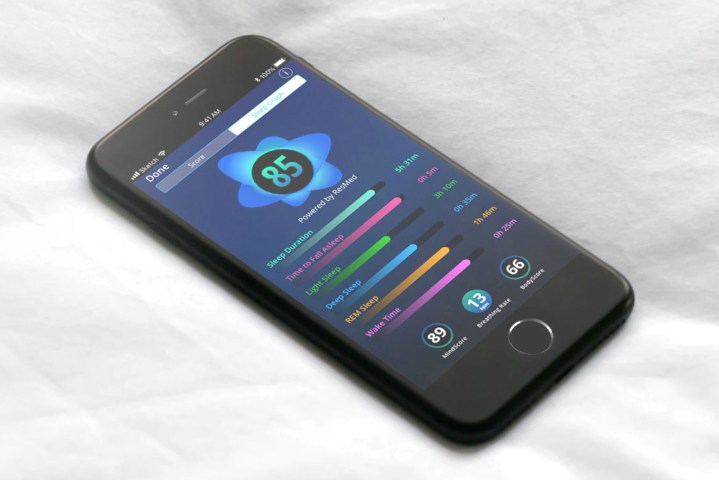
There are smart mattresses, wearables, even robots — these days it’s easy to spend a lot of money on gadgets designed to improve the quality of your slumber, and some of you may be losing sleep over trying to find the one that works best for you.
This week a free app landed that claims it can improve your sleep simply by listening to your breathing and detecting your body movements when you’re zonked out. Created by SleepScore Labs, the iOS app (Android coming in the next few weeks) uses sleep-detecting sonar algorithms developed by ResMed, a specialist in sleep medical devices.
So how do you use it? Well, fire up the app as you climb into bed (obviously) and place your smartphone on your bedside table. SleepScore then uses your handset’s speakers to send out inaudible sound waves that detect your body movements and breathing throughout the night. These sound waves return via the microphone, prompting the app’s algorithms to spring into action.
According to SleepScore, the app’s algorithms are clever enough to “interpret the shape and movement of the reflected sound waves to sense full breathing wave form and body movements.”
It goes on: “The combination of these signals is used to accurately decipher which sleep stage the user is in (wake, light sleep, deep sleep, or REM), as well as the number of times users wake up through the night and the time it takes to fall asleep.”
Each morning, you’ll receive a score of between 1 and 100 as an indicator of how well you slept, including a breakdown of what affected the score, such as sleep length, time to fall asleep, or interruptions. So a score in the high 90s indicates a full night of restful sleep, while a single-digit score suggests a dismal night where you might ask yourself if it was even worth going to bed.
Sleep goals
If you’re facing challenges with your sleep, the app lets you select various goals and offers advice on how you can achieve them. Like some other sleep apps, SleepScore’s includes a smart alarm that claims to wake you up “at the ideal moment” in your sleep cycle, though let’s face it, there’s never an ideal moment to be awoken by a machine-generated noise.
The app will also give you “personalized product recommendations” based on your data that may include anything from “innovative pillows to sound machines and snoring solutions.” That means it might give a shout-out to its Max sleep aid, a bedside gadget priced at $150.
In-app purchases
Cough up for in-app purchases and you’ll receive your complete sleep history, trend and correlations analytics, exportable data, and a sleep report for your doctor if your nighttime issues are something of a nightmare.
“We’re excited that for the first time, virtually everyone can get a truer picture of their sleep health for free and make smarter decisions about how to get a more restful night’s sleep,” said Colin Lawlor, CEO of SleepScore Labs.
The company says that at least 1.2 billion people around the world suffer from a variety of sleep issues, while almost 60 percent of the global population “misunderstand their own sleep problems due to a lack of measurable insights.”
If you suspect your current sleep tracker or wearable device is pushing out inaccurate data about your time in Slumberland, then SleepScore’s free sleep-tracking app may be worth a shot.
Editors' Recommendations
- Meta’s ChatGPT killer is taking over your favorite apps
- The 10 best apps for your 2024 New Year’s resolutions
- TikTok just launched a new way for you to make money on the app
- You can finally move your WhatsApp chats from Android to iOS
- Sleep apps are booming but experts warn they are not perfect


